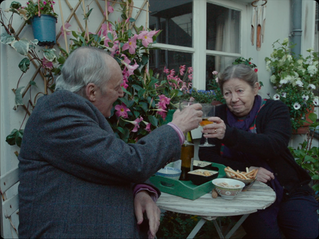Unpeopled Space: Two or Three Things I Know About Her
- Edward Pomykaj
- Feb 15, 2022
- 4 min read
Jean-Luc Godard, 1967

Jean-Luc Godard’s Two or Three Things I Know About Her is a film of questions. The film loosely tracks a single day in the life of a bourgeoise Parisian woman, Juliette, during which she drops her kids off at school, goes shopping, visits her husband at his job where he works as a car mechanic, and engages in prostitution to make some extra cash. But the real protagonist is Godard himself, who whisper-narrates his existential and political insecurities to the viewer throughout the entirety of the feature, varying from his concerns with the growing presence of U.S. imperial forces in Southeast Asia, to more personal difficulties focused on the nature of being a filmmaker and the effects of media on language and humanity. The scope of Godard’s anxiety is wide, and thus, the film itself plays like an amalgam of distinct moments, each pointing out something uncanny or concerning before moving on to something else without resolve.
Godard himself has very few answers. And you get the sense that even he has trouble believing in the couple of answers he does provide, as if they are too simple, too obvious. Ultimately, he makes only a single claim throughout the film, and it’s perhaps the simplest argument he could think of. He says: “Objects exist.” This he is certain of.
But this isn’t as simple of a point as it at first seems, for he follows it up to say, “if we pay more attention to [objects] than to people, it’s because they exist more than those people.” And this point is the very thing Godard seems to be challenging via his film. He is trying to study a single subject — Juliette — so as to understand the individuals who fill the space between objects, who float about never knowing one another, only ever interacting through connections that come about via the objects they engage with. This is the point of the famous coffee scene, in which he says, “maybe an object is what serves as a link between subjects.” He wants to remove that link and know the subjects themselves. This is the attempt made by the film itself.
But ultimately, the film only ends up pointing towards this impossibility. As he tracks Juliette’s day, he finds himself distracted, by cars, signs and advertisements, by coffee, construction. And we watch Juliette herself forget many of the closest people in her life as she wanders about Paris shopping, getting her hair done, and drinking a coke in a bar. Aside from her mornings and evenings with her husband — during which her husband obsesses over his radio, and she does the dishes — most of her human-to-human interactions come about through prostitution, where for the most part she disassociates anyways. In Godard’s attempt to know another’s subjectivity he finds only “links” — things that allow him to “live in a society” with Juliette, as he puts it — which draws him further into his own isolation, his narration.
Godard knows this by the end of the film, and says, “I forget Hiroshima and Auschwitz. I forget Budapest… I’ve forgotten it all, except that since it takes me back to zero, I have to start from there.” The final question Godard seems to ask is, “what do we have left of Juliette?” And then we have the final shot, which features an assortment of cleaning supplies placed in grass, as if this is all that remains of her.
The objects bring us back to a recurring moment in the film, during which Juliette explains a feeling she had while cleaning the dishes when she felt connected to the world. She says, “suddenly I felt I was the world, and the world was me.” By reminding us of this moment, the film suggests not simply a disdain for consumption, but instead, a sympathy — a way of understanding the temptation of capitalism, taking stock of the challenges ahead of any real revolutionary movement. Objects as links can provide us with transcendence, ways of seeing oneself as related and a part of the larger world around them. Even the most innocuous of objects can lend themselves to revelation. But this point is just as frustrating to Godard as it is helpful.
The final frame succinctly expresses Godard’s frustration with the political and philosophical frustrations of his time, offering us a “landscape” of modernity. Rather than empty fields of tall grass or flowers, the modern pastoral scene is full of products, reminders of humanity, though clearly without it. It’s an uncomplicated representation of the climate crisis, capitalistic exhaustion, anti-feminism as necessitated by consumerism, and so much more. It’s an anti-ad, relenting the presence of these products as futile devices for connection.
Godard tells us that these objects are more real than Juliette, who is herself just a creation, a character in a film, created at its start and destroyed at its end. Over the cut grass, these cleaning supplies are like a gravestone, a depressing monument to an incredibly complicated character, who we — the viewers — at least tried to know.








Comments